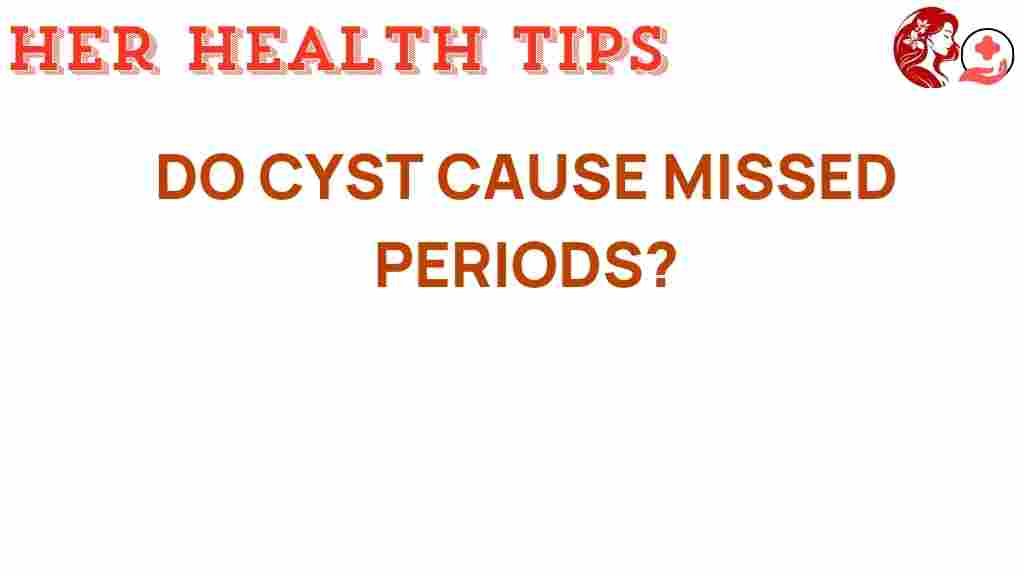The Surprising Link Between Cysts and Missed Periods
Many women experience missed periods at some point in their lives, often attributing it to stress, pregnancy, or lifestyle changes. However, a lesser-known factor that can significantly impact women’s health is the presence of cysts, particularly ovarian cysts. Understanding the connection between cysts and missed periods is crucial for women’s reproductive health.
This article will explore how cysts can lead to missed periods, the underlying hormonal imbalances, and the importance of diagnosis and treatment. We will also discuss symptoms to watch for and provide troubleshooting tips for managing your menstrual cycle.
What Are Cysts?
Cysts are fluid-filled sacs that can develop in various parts of the body, including the ovaries. In women, ovarian cysts are quite common and often form during the menstrual cycle. While many cysts are harmless and resolve on their own, some can lead to complications and affect reproductive health.
Types of Ovarian Cysts
There are several types of ovarian cysts, including:
- Functional Cysts: These are the most common type and include follicular cysts and corpus luteum cysts, which typically form during ovulation.
- Dermoid Cysts: These can contain various tissues, such as hair and skin, and develop from the cells that produce eggs.
- Endometriomas: These are associated with endometriosis and can cause significant pain and missed periods.
- Polycystic Ovary Syndrome (PCOS): A condition characterized by multiple cysts on the ovaries, leading to hormonal imbalances and missed periods.
The Relationship Between Cysts and Missed Periods
Missed periods can be a sign of various health issues, including hormonal imbalances. Cysts can influence hormonal levels, which directly affects the menstrual cycle. Here’s how:
Hormonal Imbalance and Its Effects
Hormonal imbalances are common in women with cysts, particularly those with conditions like PCOS. The primary hormones involved in the menstrual cycle are:
- Estrogen: Regulates the menstrual cycle and prepares the uterus for potential pregnancy.
- Progesterone: Stabilizes the uterine lining after ovulation.
- Luteinizing Hormone (LH) and Follicle-Stimulating Hormone (FSH): Control the growth and release of eggs from the ovaries.
When cysts disrupt the normal function of these hormones, it can lead to missed periods. For example, in PCOS, elevated levels of androgens (male hormones) can prevent ovulation, leading to irregular menstrual cycles or missed periods.
How Cysts Affect Ovulation
Ovulation is a critical part of the menstrual cycle, and cysts can interfere with this process. Here are some ways cysts impact ovulation:
- Prevention of Egg Release: Cysts can form in place of a mature follicle, preventing the egg from being released during ovulation.
- Delayed Ovulation: The presence of cysts can cause hormonal fluctuations that delay or inhibit ovulation.
- Increased Pain and Discomfort: Some cysts, particularly endometriomas, can cause pain that may lead women to avoid activities that stimulate ovulation.
Symptoms of Cysts and Missed Periods
Recognizing the symptoms of cysts can help women understand their reproductive health better. Common symptoms include:
- Irregular menstrual cycles or missed periods
- Pelvic pain or discomfort
- Bloating or fullness in the abdomen
- Changes in weight (either gain or loss)
- Acne or excess hair growth (especially in PCOS)
If you experience these symptoms along with missed periods, it’s essential to consult a healthcare provider for proper diagnosis and treatment.
Diagnosis of Cysts
Diagnosing cysts involves several steps, often starting with a thorough medical history and physical examination. Here’s what to expect:
Step-by-Step Diagnosis Process
- Medical History: Discuss your menstrual cycle, any missed periods, and symptoms with your doctor.
- Physical Examination: A pelvic exam may be conducted to check for any abnormalities.
- Imaging Tests: Ultrasounds are commonly used to visualize cysts and assess their size and type.
- Blood Tests: Hormonal levels may be checked to identify any imbalances affecting the menstrual cycle.
Early diagnosis is crucial for effective treatment and management of symptoms related to cysts and missed periods.
Troubleshooting Tips for Managing Missed Periods
If you are experiencing missed periods potentially related to cysts, consider the following tips:
1. Maintain a Healthy Lifestyle
Eating a balanced diet and exercising regularly can help regulate hormones and support reproductive health. Focus on:
- Fruits and vegetables
- Whole grains
- Lean proteins
- Healthy fats
2. Manage Stress
Stress can exacerbate hormonal imbalances. Practice stress-reducing techniques such as:
- Meditation
- Yoga
- Deep breathing exercises
3. Monitor Your Menstrual Cycle
Keep track of your menstrual cycle using apps or calendars. Note any changes, missed periods, and associated symptoms to share with your healthcare provider.
4. Consult with a Healthcare Provider
If missed periods persist, consult with a healthcare provider specializing in women’s health. They can offer tailored advice and treatment options, which may include:
- Hormonal therapy
- Medications to manage symptoms
- Surgery for larger or problematic cysts
Conclusion
The connection between cysts and missed periods is significant and often overlooked in discussions about women’s health. Understanding how cysts can affect hormonal balance and ovulation is crucial for managing reproductive health.
If you suspect that cysts may be impacting your menstrual cycle, it’s essential to seek a proper diagnosis and treatment. By maintaining a healthy lifestyle, managing stress, and consulting with a healthcare provider, you can take proactive steps toward better reproductive health.
For more information on women’s health and cyst management, check out this comprehensive guide. Remember, your health is in your hands, and staying informed is the first step toward wellness.
Additionally, for external resources, visit the Women’s Health Network for valuable insights and support.
This article is in the category Reproductive and created by HerHealthTips Team
